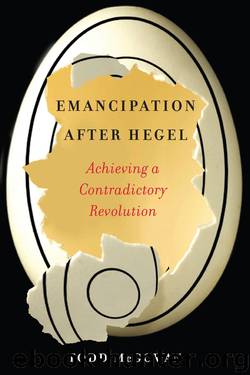Emancipation After Hegel by Todd McGowan;

Author:Todd McGowan;
Language: eng
Format: epub
Publisher: Lightning Source Inc. (Tier 3)
THE ABSENCE OF IDEALISM
There are two standard readings of the Philosophy of History, both of which take Hegel as an idealist in the strict sense. The worst of these, favored especially by Hegel’s opponents, sees history as a teleological narrative directed by a transcendent God who uses particular historical events and actors to accomplish the universal goal of freedom. According to this reading, Hegel’s indifference to the suffering of particulars sacrificed in the slaughterhouse of history is the necessary by-product of his investment in the end point of the historical narrative.
The second reading posits an immanent development of freedom in history: though no transcendent force plans the development of history, it moves in the direction of freedom because of a human longing to be free. The spirit of freedom guides subjects unconsciously toward history’s ultimate end point. In the most sophisticated form of this reading, the dialectical logic of historical development doesn’t determine specific events but relies on a series of contingent events to achieve its aim.
The majority of the significant interpreters of Hegel writing today—Slavoj Žižek, Catherine Malabou, Rebecca Comay, Sally Sedgwick, and Susan Buck-Morss, just to name a few—avoid the Philosophy of History like the plague. When one sees how much fun Hegel’s opponents have with this work, it’s tough to blame them. Karl Popper’s sarcastic quip—“it was child’s play for his powerful dialectical methods to draw real physical rabbits out of purely metaphysical silk-hats”—hints at the extent of the ridicule heaped on this work.27 Those who do discuss it, such as Robert Pippin, do so in much the same way that Kojève does—through their reading of the Phenomenology of Spirit and the project of mutual recognition they find in that text. The Philosophy of History is anathema because it seems impossible to reconcile it with the materialism that these interpreters (along with most contemporary subjects) share.
Hegel’s account of history is unabashedly idealist. Hegel envisions subjects driving the movement of history through their commitment to realizing their ideas. It is not “the mode of production of material life” that triggers historical transformation but the idea of freedom, which is why this work from Hegel, more than any other, leads Marx famously to accuse Hegel of standing on his head and thinking the dialectic upside down. Marx offers a corrective in his thought: turning Hegel right side up, putting the dialectic on its feet, and advocating materialism. Marx has it right when he describes Hegel as turning thought upside down, but this is the source of his radicality that Marx pulls back from. As a thinker of contradiction, we should imagine Hegel, as Marx does, thinking while standing on his head. Perhaps thinking dialectically requires such a position, which expresses the discomfort that dialectical thought brings to our everyday life. But, in any event, Marx’s materialist corrective is unnecessary. When we consider the Philosophy of History in light of the Science of Logic, its runaway idealism diminishes.
From this new perspective, freedom ceases to exist as an idea separated from any material origin and becomes the ideal correlate of the structure of being.
Download
This site does not store any files on its server. We only index and link to content provided by other sites. Please contact the content providers to delete copyright contents if any and email us, we'll remove relevant links or contents immediately.
The Secret History by Donna Tartt(16642)
The Social Justice Warrior Handbook by Lisa De Pasquale(11492)
Thirteen Reasons Why by Jay Asher(7796)
This Is How You Lose Her by Junot Diaz(5789)
Weapons of Math Destruction by Cathy O'Neil(5044)
Zero to One by Peter Thiel(4831)
The Myth of the Strong Leader by Archie Brown(4795)
Promise Me, Dad by Joe Biden(4452)
Beartown by Fredrik Backman(4426)
Stone's Rules by Roger Stone(4420)
How Democracies Die by Steven Levitsky & Daniel Ziblatt(4407)
The Fire Next Time by James Baldwin(4348)
100 Deadly Skills by Clint Emerson(4084)
A Higher Loyalty: Truth, Lies, and Leadership by James Comey(4038)
Rise and Kill First by Ronen Bergman(4016)
The David Icke Guide to the Global Conspiracy (and how to end it) by David Icke(3887)
The Farm by Tom Rob Smith(3878)
Secrecy World by Jake Bernstein(3787)
The Doomsday Machine by Daniel Ellsberg(3736)
